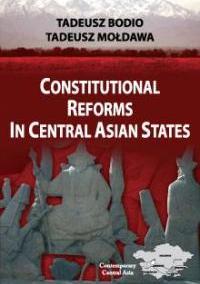 This study is devoted to pivotal issues of systemic transformation in Central Asia. It focuses on the building of constitutional order in Kazakhstan, Kyrgyzstan, Tajikistan, Turkmenistan and Uzbekistan. It analyzes the legal and political determinants of reaching independence, the circumstances in which first constitutions are enacted, constitutional reforms, and the many important implications of these developments for transformational practice. Constitutional reforms merit the most attention chiefly because of the high frequency at which changes are introduced into constitutions – the never-ending adjustments made to suit the needs of the power elites and political practice. The research discussed in the monograph reveals a complex process of building a political and legal order in each of the states of Central Asia. It is based on constitutions and constitutional reforms which form the time of independence-proclamations to date. Equally dramatic are the clashes between oriental tradition and political modernization, so typical of transition-states in this region. The outcome is the trivialization of democracy, armed strife, coup d’états, parliamentary crises, ethnic and religious conflicts, appropriation of power by clans, repression of political opposition, censorship and vote rigging, the instrumental treatment of the constitution, and curtailed human rights and civil liberties.
This study is devoted to pivotal issues of systemic transformation in Central Asia. It focuses on the building of constitutional order in Kazakhstan, Kyrgyzstan, Tajikistan, Turkmenistan and Uzbekistan. It analyzes the legal and political determinants of reaching independence, the circumstances in which first constitutions are enacted, constitutional reforms, and the many important implications of these developments for transformational practice. Constitutional reforms merit the most attention chiefly because of the high frequency at which changes are introduced into constitutions – the never-ending adjustments made to suit the needs of the power elites and political practice. The research discussed in the monograph reveals a complex process of building a political and legal order in each of the states of Central Asia. It is based on constitutions and constitutional reforms which form the time of independence-proclamations to date. Equally dramatic are the clashes between oriental tradition and political modernization, so typical of transition-states in this region. The outcome is the trivialization of democracy, armed strife, coup d’états, parliamentary crises, ethnic and religious conflicts, appropriation of power by clans, repression of political opposition, censorship and vote rigging, the instrumental treatment of the constitution, and curtailed human rights and civil liberties.
-
Ostatnie wpisy
- Anna Czyż, Tendencje niedemokratyczne w Republice Słowackiej, Studia Politologiczne vol. 47
- Mateusz Wajzer, Teoriogrowe analizy zjawisk politycznych z wykorzystaniem programu Gambit, Studia Politologiczne vol. 49
- Agata Włodkowska-Bagan, Rosyjska ofensywa propagandowa. Casus Ukrainy, Studia Politologiczne vol. 49
- Anna Sroka, Katarzyna Trofimowicz-Kalinowska, Zagadnienia radykalizmu politycznego i terroryzmu w strategiach bezpieczeństwa Polski i Hiszpanii po 2001 roku, Studia Politologiczne vol. 49
- Agnieszka Legucka, Dylemat bezpieczeństwa w stosunkach polsko-rosyjskich po 2014 roku, Studia Politologiczne vol. 49
Najnowsze komentarze
Archiwa
- grudzień 2021
- wrzesień 2021
- sierpień 2021
- lipiec 2021
- maj 2021
- lipiec 2020
- grudzień 2018
- czerwiec 2018
- marzec 2018
- październik 2017
- sierpień 2017
- lipiec 2017
- maj 2017
- kwiecień 2017
- marzec 2017
- sierpień 2016
- kwiecień 2016
- marzec 2016
- luty 2016
- październik 2015
- wrzesień 2015
- czerwiec 2015
- kwiecień 2015
- marzec 2015
- luty 2015
- grudzień 2014
- wrzesień 2014
- lipiec 2014
- czerwiec 2014
- maj 2014
- luty 2014
- listopad 2013
- październik 2013
- wrzesień 2013
- sierpień 2013
- lipiec 2013
- czerwiec 2013
- kwiecień 2013
- marzec 2013
- luty 2013
Kategorie
Meta
